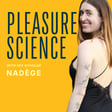
Discover the Largest Sex Library in the World
Discover the largest sex library in the world: The Carter Johnson Library!
In episode 2 of the Pleasure Science Podcast, I’m joined by “Mama” Vi Johnson, the historian and curator of the library with the biggest collection of kink history, sex history, and LGBTQ+ history in the world.
Right about now you’re probably wondering two things: how did this library come to be and why haven’t I heard about it?!
Well, be prepared to find out:
- The inspiring true story behind the Carter Johnson Library
- What spicy historical facts Mama Vi is currently researching
- How you can help preserve sex history
- And so much more!
Viola Johnson, affectionately known as Mama Vi, is a leatherwoman, activist, motivational speaker, and author who has been active in the leather BDSM scene for five decades.
Her story, and the story of the Carter Johnson Library, is profound. It will make you gasp, laugh, cry, and leave you filled with hope.
I am so excited to share this episode with you.
Episode website: https://pleasurescience.com/s1e2-sex-library
Show Notes
Pleasure Science Courses - Use pleasuresciencepod at checkout to receive 10% off!
WEB • www.pleasurescience.com
BLOG • Pleasure Science on Medium
@PleasureScience on Instagram, TikTok, and YouTube
Carter Johnson Library on Instagram and Facebook
To donate to the library -> info@leatherlibrary.org on PayPal
Info about Magnus Hirschfeld and the Hirschfeld library
People to check out that Mama Vi mentions:


